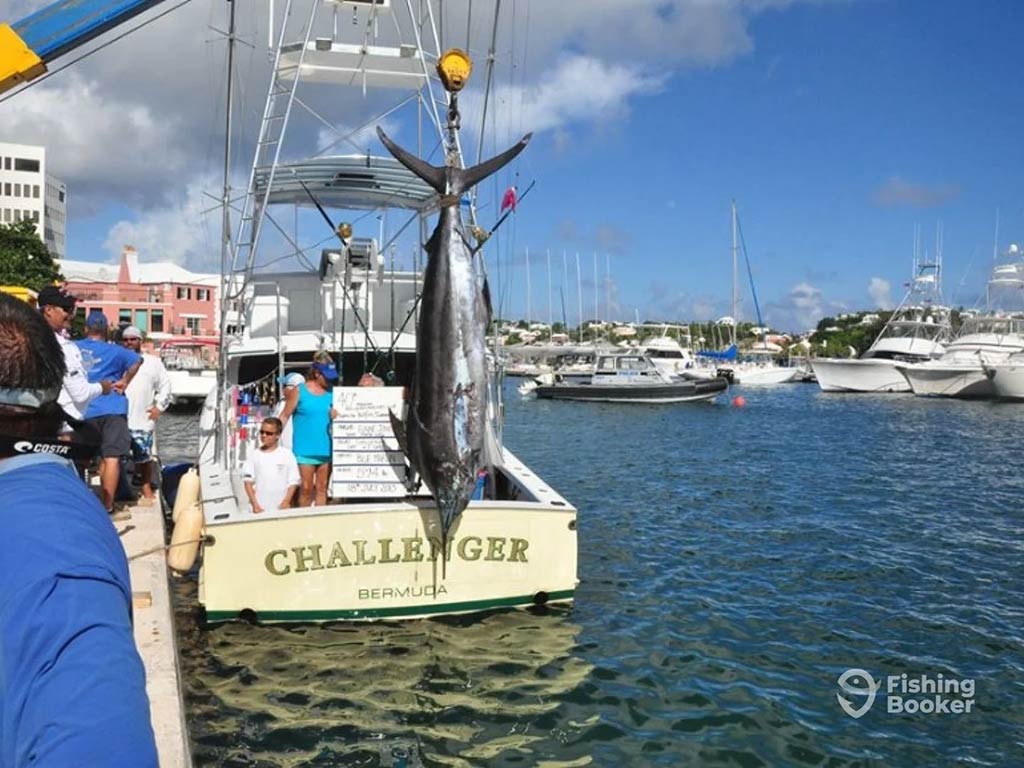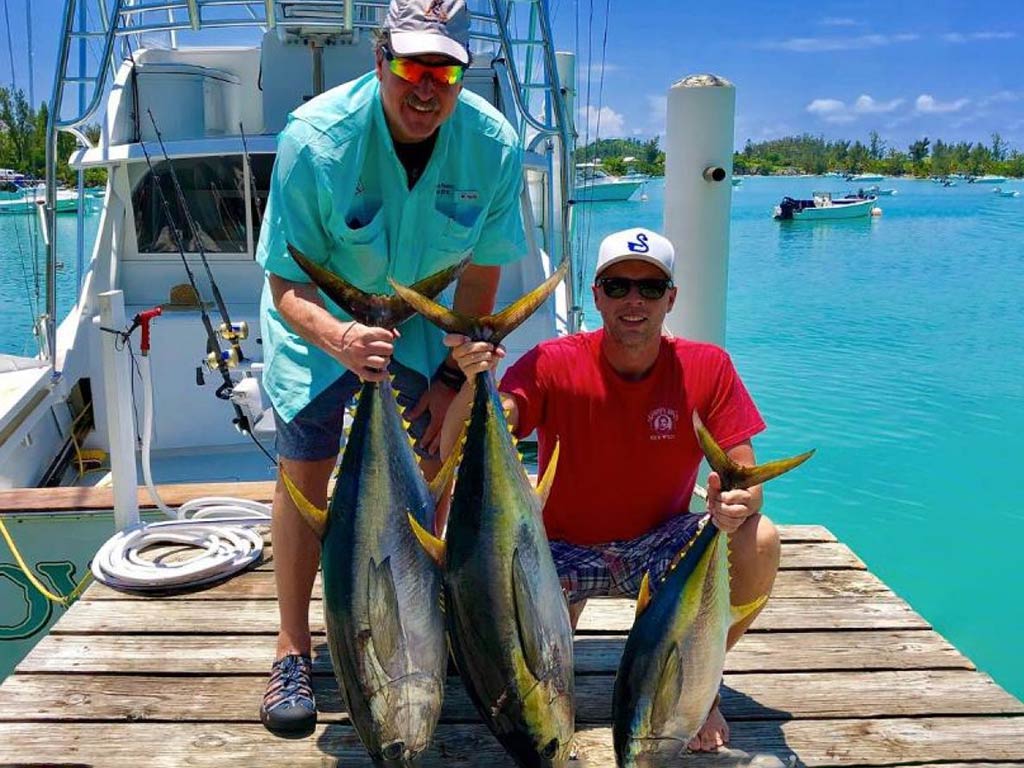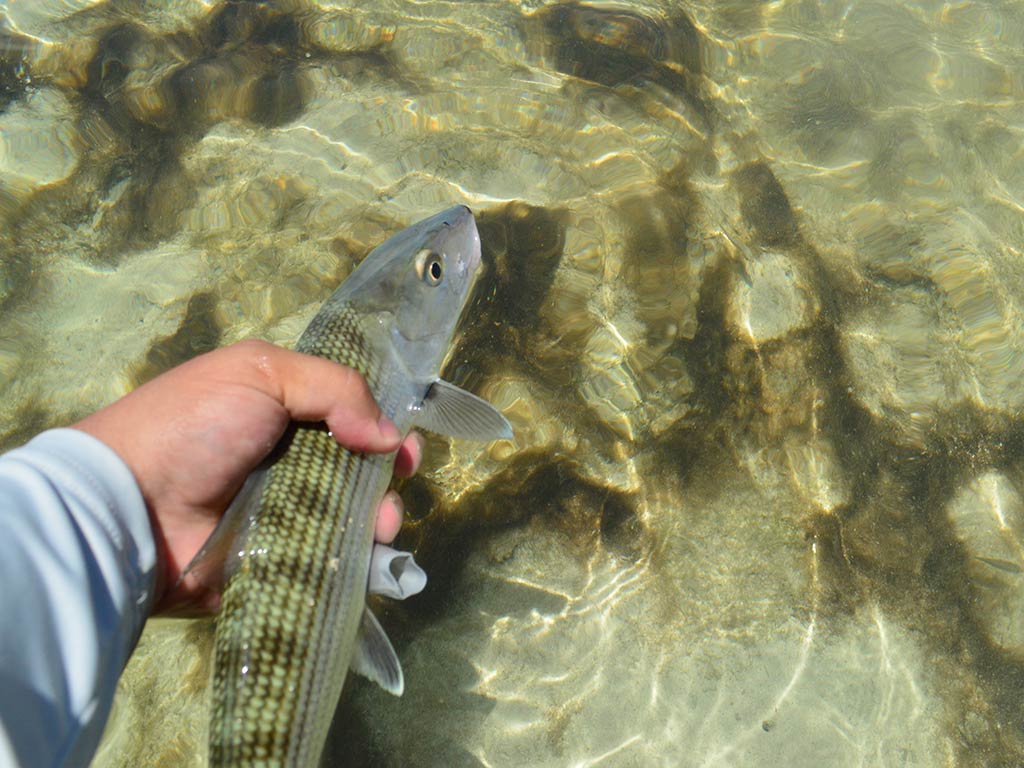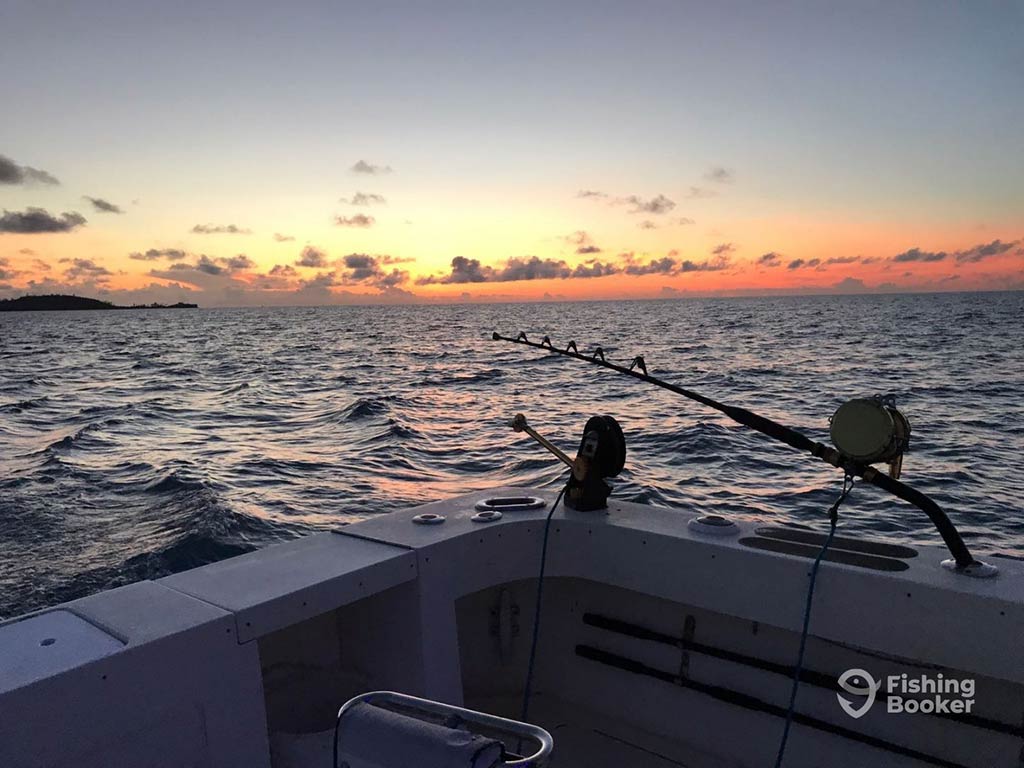If you’re looking for one of the best places on the planet to go after Marlin, look no further than fishing in Bermuda. This British collection of seven main and over 150 smaller islands has a reputation for world-class tournament fishing and is a tropical paradise. While some mistakenly place it in the Caribbean, Bermuda is actually a picturesque archipelago in the North Atlantic Ocean, located about 600 miles off the coast of Cape Hatteras, NC.

Bermuda’s unique charm extends way beyond the famous Triangle. The Island is home to pink-sand beaches, turquoise waters, coral reefs, deep seas, and a rich blend of British, African, and Caribbean influences. Natural beauty and heritage with a touch of mystery are just part of the Bermuda charm.
In this guide, we’ll talk about how Bermuda captivates the hearts of those who set foot on its shores. You’ll learn about the most exciting fish species you can catch, the must-visit spots, techniques, and more. Let’s dive in!
Why Bermuda?
Entrenched in mystery because of the Triangle, the islands offer far more than that. They sit on top of a vast reef platform, surrounded by the endless waters of the mighty Atlantic Ocean . The local topography provides excellent big game fishing opportunities and the nearby Gulf Stream makes sure the water temperatures never drop below 62°F. As soon as the weather permits (usually April), locals and visitors begin their hunt for the largest game species in the sea.
As soon as you step foot in the Bermudas, you’ll be able to enjoy its architectural marvels, crystal-clear waters, historic streets, and its own unique charm. And, of course, all the fishing it has to offer.
Top Fish in Bermuda to Target
It’s no secret that Bermuda is home to all sorts of saltwater fish species. You’ll find an interesting selection of targets in from the pink sandy beaches in the flats, coral reefs, and the deep offshore grounds. Let’s talk about the top catches in these diverse waters.
Deep Sea Fishing in Bermuda
All sides of the islands offer deep sea fishing. The southern and northern fringes of the reefs, paired with the eastern “Bermuda Edge,” are home to prized species such as Tuna and Billfish. If these species aren’t enough for you, you can always chase Mahi Mahi, Sharks, Rainbow Runner, Wahoo, and Amberjack.
Billfish
As a premier Billfish destination, Bermuda is home to Blue and White Marlin, Atlantic Sailfish, Spearfish, and Swordfish. Such an impressive selection of large game fish has been capturing the attention of the most experienced sport anglers from around the world for a while, making Bermuda a renowned tournament fishing destination.

Trolling the waters between the Challenger and Argus Banks and the Bermuda Edge can bring you up close and personal with large Blue Marlin. Locals often report catches over 300 pounds, with some people landing fish up to 1,000 pounds! The season for Blue Marlin and Spearfish runs from May to October, peaking in June and July.
As soon as you’re done with the Blue Marlin season, you can switch your attention to White Marlin, which bite best from August through September. These are followed by Sailfish. These predators are especially active on the eastern side of Bermuda. Meanwhile, Swordfish are active year round, particularly during the spring and fall months near seamounts and canyons.
Trolling is the go-to technique for Marlin and Sailfish, although your chosen technique will vary depending on the species. As for Swordfish, consider booking an overnight charter to go deep dropping for these nocturnal predators.
Tuna
While Marlin fishing is impressive enough, Tuna fishing in Bermuda isn’t any less impressive. And if big game action isn’t your thing, light tackle enthusiasts get the added bonus of False Albacore.

So, which Tuna can you expect to come across on the island? Bermuda is home to Blackfin and Yellowfin Tuna. Blackfins stay in the waters throughout the year, although the bite is stronger from mid-spring all the way until mid-fall. Yellowfin fishing, on the other hand, peaks sometime around June, and the action stays strong until September.
Deepwater canyons, sea mounts, and banks are the most productive Tuna playgrounds. Look for temperature breaks and bird activity, as these usually indicate the presence of bait fish. Locals usually prefer trolling, chunking, or jigging, although some try kite fishing with live baits. When it comes to Tuna fishing, it’s definitely a good idea to follow your guide’s advice.
Reef Fishing in Bermuda
Coral reefs are abundant around the islands, attracting all sorts of fish. Reef enthusiasts don’t really chase the largest trophies around. Instead, they concentrate on pulling in good numbers of fish.
The shallows over the reefs hold schools of Lane Snapper and Triggerfish, along with Bermuda Chub. If you move a bit deeper towards coral areas, you can expect to come across school-size Amberjack, Porgy, Wrasse, Groupers, Almaco Jack, Coney, Barracuda, and who knows what else.
Snapper
Snapper fishing in Bermuda is abundant, rewarding anglers that explore shallow waters on the reefs. That’s where you can find Lane Snapper, locally known as “Whitewater” Snapper. These creatures bite year-round on the island’s reefs, wrecks, and rocky bottoms.
In fact, all Bermuda Snappers – Yellowtail, Pink, and Grey – are around throughout the year. You can fill the cooler or earn bragging rights as long as you follow the local rules and regulations.
Look for Yellowtail and Pink on reefs and wrecks from 30–200 feet deep. Or you can head to the mangroves, shallow reefs, and seagrass beds to hunt for Grey Snapper. Snappers can be wary, so patience is key when you’re trying to entice their bite. Bottom fishing or drifting with cut bait works best, although some locals chum to attract Yellowtail.
Flats Fishing in Bermuda
Bermuda is an excellent place to look for record-breaking Bonefish. It’s as simple as that. Pair that with the occasional Tarpon and Permit, and Bermuda becomes one of the best places to land an “Inshore Grand Slam.” The pleasure, however, is seasonal, lasting from April until October.
Bonefish

Bermuda’s flats hold some of the world’s largest Bonefish between the months of April and October, when the waters are warm. The shallow, sheltered environment of Harrington Sound is a good spot to start your hunt for Bonefish, along with the seagrass beds and shallow flats of Flatt’s Inlet.
You can try spinning or fly fishing in various flats and smaller channels around the islands, the mangrove-lined shores of Castle Harbour, and the sandy flats of Somerset Long Bay.
It’s no secret that Bonefish are some of the spookiest fish species around, so make sure to approach them quietly and delicately. This is especially important while sight fishing. Look for incoming and outgoing tides, when the fish move onto the flats to feed.
Where can I go fishing in Bermuda?
Now that you know what species you can catch in Bermuda’s waters, it’s time to talk about the most productive spots to explore. Here’s a quick list of the top Bermuda fishing locations for you to consider:
- Challenger Banks: This deep sea fishing spot is located about 20 miles southeast from the main island. The main targets here are Tuna, Marlin, and Wahoo.
- Harrington Sound: This inland fishing spot is right in the center of Bermuda. Harrington Sound is a good spot for freshwater anglers, too, offering good opportunities for Bass fishing.
- North Rock: If you’re after Amberjack, Barracuda, Snapper, and Tuna, hop on board a charter vessel and head about 7 miles northeast of Bermuda.
- West Whale Bay: The bay is located on the western end of the islands. Here, you can concentrate on various types of reef fish.
- Argus Banks: As a popular deep sea fishing spot, Argus Bank holds healthy populations of Tuna, Billfish, and Wahoo. It’s located about 12 miles south of Bermuda.
- The Sluice: The Sluice is located at the western end of the archipelago. It’s a popular fly fishing spot with shallow waters, perfect for chasing Bonefish.
- South Shore Reefs: These coral reefs are located on the southern coast of Bermuda, with Snapper, Grouper, and Jacks among the most popular catches.
How can I go fishing in Bermuda?
There are two main types of fishing available in Bermuda: shore fishing and charter fishing. If you don’t feel like spending your day on a boat, there are various playgrounds available across the islands.

Some of the best shoreline fishing happens on Pompano’s waterfront. Here, you can get your hands on Bonefish and, you guessed it, Pompano! Jacks, Bermuda Chub, Triggerfish, Grunts, Bream, and other fish species are also available off the resort’s dock. Alternatively, you can cast a line from other jetties, beaches, and docks around Bermuda.
When booking a trip with a local charter, you can try your hand at various techniques and venture out to the offshore waters. Fishing with a local guide can help you explore the banks, the Bermuda Edge, and many other spots accessible only by boat. Plus, you can try your hand at a range of techniques, such as bottom fishing, trolling, chumming, and fly fishing to name a few.
Not only that, but heading out with a guide will mean that you won’t have to worry about a thing. They’ll provide all the gear you need for your trip, and they’ll have that all-important local knowledge to help you land the fish of your dreams.
Bermuda Fishing Seasons
Bermuda’s fishing opportunities abound throughout the year. However, each season offers a unique blend of species and experiences. Therefore, you’ll want to time your visit correctly, depending on what you’re after.

As the waters begin to warm, the spring season welcomes migratory species. Yellowfin Tuna, Wahoo, and Blackfin Tuna appear in the deep offshore waters. The reefs, on the other hand, are all about Triggerfish and Bonefish, which also start to show up in the flats.
Summer is usually the prime season for sportfishing in Bermuda. It’s also when the Bermuda Billfish Release Cup takes place, luring anglers from all over the world. Almost everything is in season and biting both inshore and offshore. Get ready to target Wahoo, Mahi Mahi, Tuna, Billfish, Snapper, Grouper, and more.
When the temperatures cool down, the fall season blends the summer and winter species. This season is all about variety, with Tuna and Marlin available offshore, and Snapper and Barracuda inshore. Come winter, locals switch their attention to the elusive Grey Snapper, which they also sometimes call the “Gray Ghost.” Long story short, no matter when you come, you’re in for a treat.
Bermuda Fishing Regulations
Before you step foot on a charter boat or cast your line from shore, there are a few things you need to keep in mind. Most fish species are legal to keep in Bermuda, although a lot of them have their own size and bag limits. Make sure to get familiar with the local rules and regulations in advance. You can find all you need from the local government’s website.
In addition to that, we suggest consider releasing the fish you caught back into the water safe and unharmed. It’s common practice to release Bonefish and Billfish, among other species.
Finally, you don’t need to purchase a fishing license to fish in Bermuda if you’re aboard a licensed fishing charter. The good news is that shore anglers also don’t need to get a special permit. However, it’s never a bad idea to double-check it ahead of time, as things can change.
Fishing in Bermuda: Small Island, Big Game

Picture this: you’re standing on a boat watching the sun dip below the horizon, casting a warm, golden glow over the coastline. You’ve just spent your day battling the biggest Marlin you’ve seen in years, and your cooler is full of promising table fare. The crystal-clear waters teem with marine life… You’re truly enjoying this island paradise.
Fishing in Bermuda is something you won’t soon forget. It’s not just about the thrill of the chase, though! it’s about unique traditions that make you feel right at home. Come check it out for yourself!
There you have it. Have you ever been fishing in Bermuda? Any fish stories you’d like to share with us? Let’s chat in the comments below!
The post Bermuda Fishing: The Complete Guide appeared first on FishingBooker Blog.
https://ift.tt/A8oEdbH
0 Comments
Enregistrer un commentaire